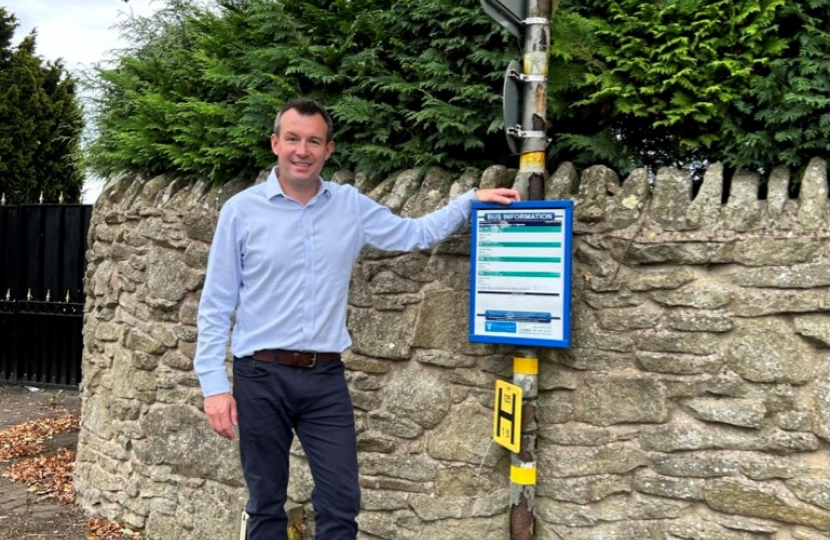
South Shropshire’s Conservative Parliamentary Candidate Stuart Anderson has launched a new campaign to secure new zero emission buses in Shropshire. It is a key part of his plan to enhance local public services across the county. The proposal is being submitted by Shropshire Council for funding from the Zero Emission Bus Regional Areas (ZEBRA) 2 scheme, a central government funding competition which will provide areas with £129 million to introduce zero-emission electric or hydrogen powered buses and charging or fuelling infrastructure that is needed to support them.
Stuart welcomed the Government’s decision to prioritise the first £25 million for rural communities where building the infrastructure needed for the buses is more expensive. It responds to a recommendation which was made in the interim evaluation report on the initial ZEBRA scheme to report ZEBs in areas which do not currently have them, including rural and inter-rural areas. Stuart said that the Government’s decision recognises the additional challenges rural areas face when seeking to introduce ZEBs compared to urban areas, both in terms of vehicle range and costs. ZEBs are also often cheaper to run, improving the economics for bus operators, and are more reliable, reducing repair costs and minimising delays. Yet nearly all of the 4,200 ZEBs that have so far been funded to date have been introduced in urban areas. Stuart added that, if secured, the new buses will help to grow the rural economy by connecting local communities across Shropshire – helping people get to work or college while providing a boost for UK manufacturing.
The campaign also delivers on Stuart’s pledge to protect the countryside, with the scheme having been introduced to support the decarbonisation of the bus fleet – a key commitment in the national bus strategy. There is up to £89 million available in financial year 23/24 and up to £40 million available in financial year 24/25. Successful bidders will be awarded the majority of their funding in financial year 23/24, taking the vision of a net zero transport network one step closer to reality. The Government said that it may decide to award more funding, of up to £50 million, to proposals for ZEBs in rural areas if enough bids of sufficient quality are received. If Stuart’s campaign is successful, the zero emission buses could be on the roads of Shropshire by the summer of 2025.
Shropshire Council has already received £1.4 million under Bus Service Improvement Plan Plus (BSIP+) in 2023/2. The county has also been allocated £2.5 million in emergency and recovery funding since March 2020 to help maintain bus services and receives £512,447 every year through the Bus Service Operators Grant (BSOG) to subsidise socially necessary services that would otherwise be commercially unviable. In addition, the Government has announced a £500 million boost to cap fares at £2 until the end of October 2023, and then at £2.50 until November 2024, as well as to protect routes into 2025. This is helping people to save money on travel and improving transport connections to deliver on the Prime Minister’s priority to grow the economy.
Stuart Anderson said: “I am pleased to launch my campaign to secure new zero emission buses in Shropshire. It is a key part of my plan to enhance local public services. By decarbonising the bus fleet, we will also be able to better protect our beautiful countryside. If successful, the new buses could be on the roads of our county by the summer of 2025, enabling residents to make greener and cleaner journeys across the county. Reduced repair costs could also help to drive down the cost of public transport in the longer term, helping to unite our communities and grow the economy.”
Council Leader Lezley Picton said: “Everyone deserves to have access to clean, green and reliable bus journeys, so I am delighted to support Stuart’s campaign to introduce new zero emission buses across Shropshire. We have already piloted our first fully electric, zero emission on-demand bus service – thanks to government investment. This extra funding would improve journeys for more passengers, reaching those in the most remote areas of our county.”




